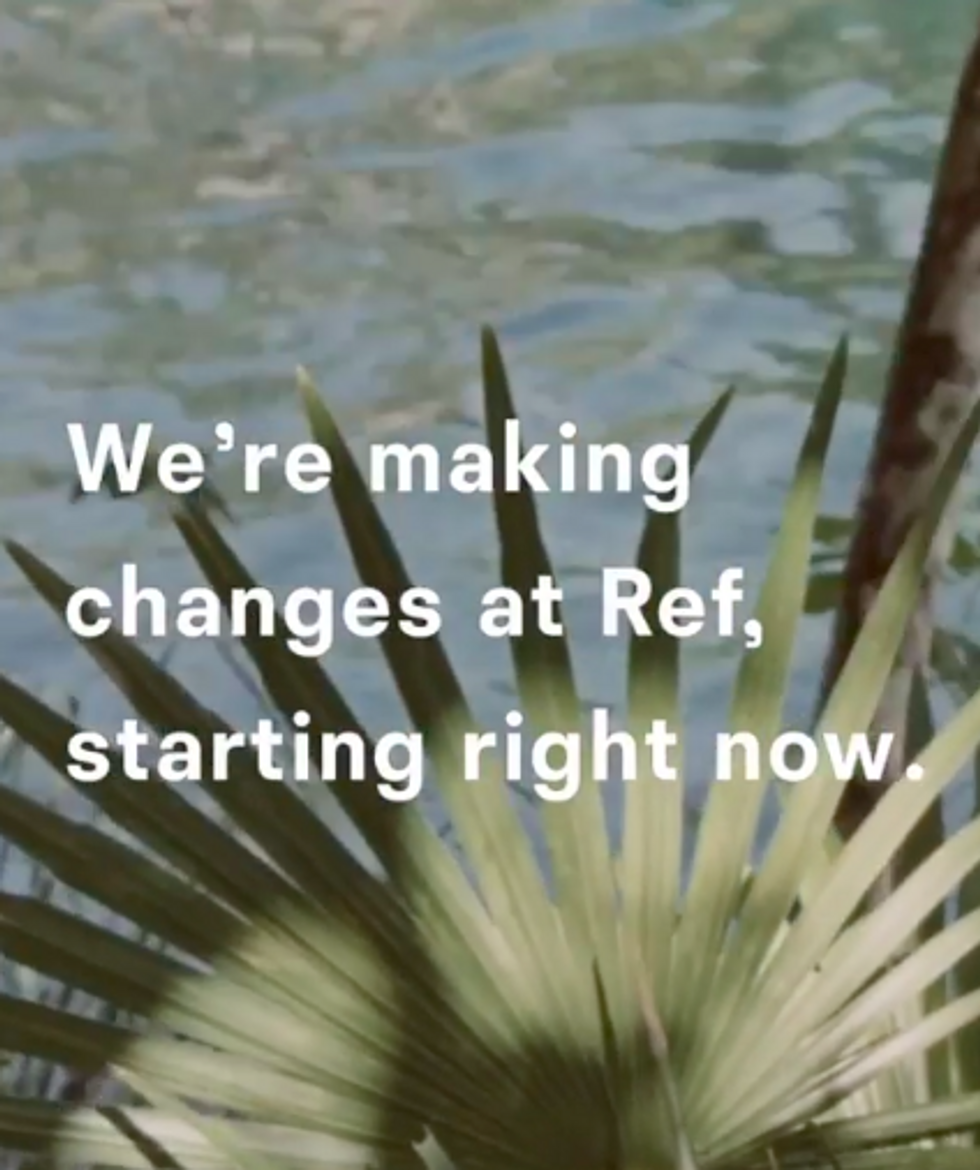
Outdoor Voices ad campaign 2019
There’s a certain type of millennial, quasi-political, female-forward brand that feels like, if she were a person, would have bullied me in high school.
She doesn’t think twice about eating SweetGreen every day, considers laptop stickers a form of political speech, and schedules her bikini waxes eight months in advance. Now, she is tasked with the necessary work of acknowledging her complicity in perpetuating centuries-long racial inequity. One after another, apology posts from these types of brands pop up on my Instagram feed.
There are a few common denominators here, starting with the apologies themselves. The Instagram posts tend to be relatively simple: a few words in block script, typically written in the signature font of the brand. Everlane’s is stylized like a poem. The athletic clothing brand Outdoor Voices says: “Now is not the time for indoor voices.” Reformation’s apology is set to a background video of palm leaves on a riverbank—perhaps the river, sparkling in the light of a sunset, hearkens self-reflection?
 Reformation’s branded apology: “We’re making changes at Ref, starting right now.”
Reformation’s branded apology: “We’re making changes at Ref, starting right now.”
Until this very moment this sort of superficial marketing, which has leaned on a late 2010s demand to appear woke, has worked. It’s worked because of the emergence of personal branding and its inevitable counterpart, the more personal brand. As the advent of social media has meant that more and more people are marketing themselves, there’s been a movement to make brands more relatable, more “real.” This movement has transcended mere corporate social responsibility; its ultimate goal is to make the customer indistinguishable from the company.
One wore Reformation because one was not only hot but climate-conscious. One bought a membership to the Wing because one wanted to strengthen and uplift other women from the vantage point of a bespoke pink velvet couch overlooking a bay window. No longer were material goods and memberships just a signal of status—they were also a signal of virtue.
Yet while the brands toted progressivism wrapped in a blush-pink package, the numbers and real-life accounts demonstrate a different story. At these companies, BIPOC employees faced hostile work environments, were let go in the middle of the pandemic, were passed up for promotions, and comprise miniscule, if nonexistent portions of leadership. A new article is published every day detailing more harassment, more accounts of employees lured into the brand under the pretense that they might work at a place which had it all—cute goods, conscious coworkers, and clout—yet found the reality of their experiences a living nightmare. These brands’ Instagram pages transcend metaphor; while there were (and are) a plethora of posts demonstrating lip-service to diversity, leadership remained enshrined in whiteness. These impermeable upper circles ran rampant with privilege, with owners so out of touch that they prioritized annual expenditures of $36K in branded water, but failed to adequately compensate their employees.
There’s something dismally predictable about watching these same brands so publicly scramble to maintain a foothold in this current moment. Just as the posts themselves resemble dominoes, falling one after another, the little black squares seem to herald the end of an era; companies which maintain a veneer of progressivism in order to fulfill a bottom line. In the days and weeks since the posts have gone up, brands such as Reformation, Outdoor Voices, and the Wing have seen their founders and CEOs step down.
One has to wonder if the pursuit of profit is antithetical to the pursuit of true activism. It’s clear now that brands that are built to evolve to socially acceptable mores— allowing their customers to stay ahead of the curve while clad in a muted pastel crop-top—are also built to fail. As long as these companies treat political awareness as a marketing scheme, they will fall short of living up to their purported principles. This isn’t to say that ethical brands don’t exist or that a company can’t have an appropriate response to Black Lives Matter. Patagonia, for example, has been a leader in sustainability for decades and has released statements signaling their understanding that social justice and environmentalism go hand in hand. While the beauty brand Glossier has internal work to do, their $1M donation to support organizations fighting racial injustice and Black-owned beauty brands also appears to be more than a gimmick.
It would seem, however, that this moment has called into question the incentive system which drives the majority of the business world; one which permits and rewards companies who treat social justice as a photo-op. These past few weeks have been a watershed moment for our country, pulling back the curtain on hollow gestures and platitudes and revealing just how little they’ve served us. At the end of the day, perhaps those brands should just stick to selling leggings.
- “RIP Taco Bell”: Denzel Skinner and Corporate “Free Speech … ›
- Your Favorite Childhood Brands Support Black Lives Matter – Popdust ›
- Ben & Jerry’s Powerful Black Lives Matter Statement – Popdust ›
- Opinion | Corporate America’s Black Lives Matter Pledges Fall Short … ›
- Corporate Voices Get Behind ‘Black Lives Matter’ Cause – The New … ›
- Glossier is Donating $1 Million to Support Black Lives Matter and … ›
- What Brands Can Learn From Away’s PR Crisis | Intelligence, BoF … ›
- The Wing Founder Audrey Gelman Resigns as Staff Protests – The … ›
- Outdoor Voices founder Tyler Haney is resigning ›
- Outdoor Voices CEO Tyler Haney Speaks ›
- Reformation CEO Yael Aflalo steps down after allegations of racist cul ›














